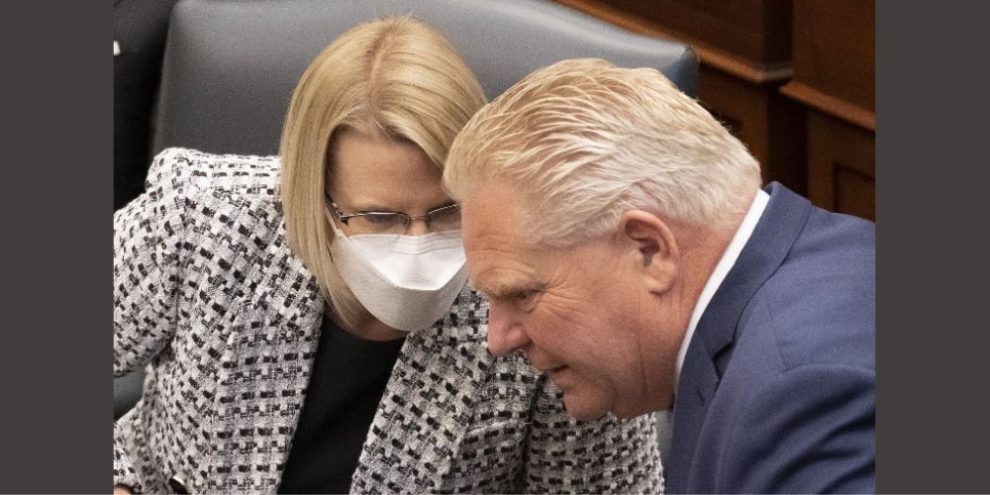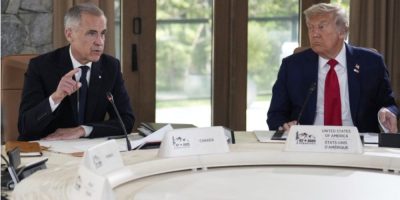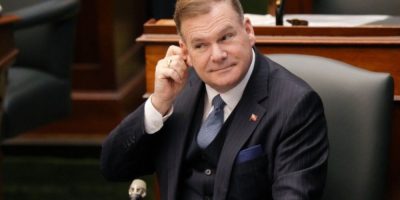
By Liam Casey and Allison Jones in Toronto
Ontario will accept any new money on health care from the federal government, the premier and health minister said Wednesday, but they are concerned about the length of the funding being offered by Ottawa.
Premier Doug Ford and Health Minister Sylvia Jones are set to meet Thursday in Toronto with federal Health Minister Jean-Yves Duclos and Intergovernmental Affairs Minister Dominic LeBlanc to discuss the details of proposed new money.
"I'm confident we'll get the T's crossed, the I's dotted," Ford said.
"We're grateful for the offer. We're grateful for sitting down with the prime minister, but we want sustainability. We need certainty moving forward, not just for a few years, five or 10 years, but decades to come."
The federal government presented an offer Tuesday to the provinces and territories that would see an additional $17 billion over 10 years added to the Canada Health Transfer.
Ottawa would also provide an immediate one-time $2 billion top-up for this year to help provinces ease the intense pressure on emergency rooms and children's hospitals.
Another $25 billion would be given for targeted funding for family doctors, mental health, surgical backlogs and health data systems.
The premiers said the offer would increase the federal share of health-care costs from 22 per cent to 24 per cent next year, far short of the 35 per cent they were seeking.
Still, Ford and Jones appeared prepared to accept the deal.
"There is no doubt that any new health-care spending and investments, we will accept," Jones said after announcing 23 new hospice beds will be added to the 500 beds available across the province.
But both want to discuss what they call the short-term nature of the funding.
Jones said she hopes to hear from Duclos "how we can ensure that these are not short-term, one-and-done programs."
"When deals come from the federal government in 10- and five-year increments, it makes it very challenging," she said.
"Whether you're looking at new medical schools, new residency positions, training and hiring new nurses – those are all things that take literally decades and will be a commitment of our government for decades."
Jones also said she is "frankly surprised" that there hasn't been more interest and conversations from the federal government on home and community care.
"To me, it is a very natural place for that patient experience to be improved and enhanced," she said.
"We know that the vast majority of people, whether they are aging in place, or recovering post-surgery, often have a component of their treatment where they are at home, needing less care, but still needing important care as they recover or age."
The premier has said he would use the new money to hire more doctors and nurses, boost home care and invest in long-term care.
"The federal money will assist in, frankly, a lot of the investments and enhancements that we are making now," Jones said.
Negotiations over a new health-care deal for the provinces have dragged on for two years. The premiers had insisted no strings be attached to any new money.
But Ford relented on that stance last month, saying the province would commit to sharing health data and outcomes for a national database, something the federal government wanted.
On Tuesday, Ontario's fiscal watchdog said the province has a $5 billion funding shortfall in health-care, but a large contingency fund of billions of dollars that could cover that amount.
Jones said Wednesday money is earmarked to cover a variety of health-care programs throughout the year, saying the report by the Financial Accountability Office of Ontario is a snapshot in time that does not provide the full picture of its expenditures.
The province has made numerous changes to health care since Ford's Progressive Conservatives won a second term last spring.
That includes shifting more cataract surgeries and knee and hip replacements to private clinics. Patients will not have to pay for those procedures, Ford and Jones have said.
The CEO of AdvantAge Ontario, an association representing non-profit long-term care homes in the province, wants to ensure new money is used for new initiatives.
"We want funding that will truly advance the level and quality of care we can offer seniors," Lisa Levin said.
"That includes funding for a broader array of staff, including physiotherapists, social workers, and investments to support homes in transitioning to emotion-focused models of care."
This report by The Canadian Press was first published Feb. 8, 2023.
Banner image via The Canadian Press






